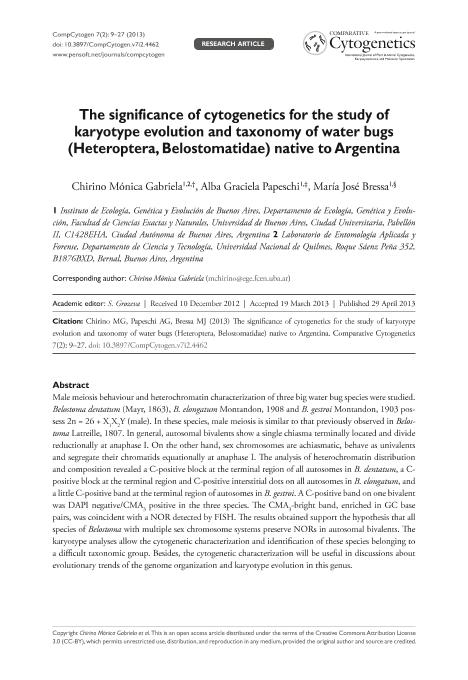Mostrar el registro sencillo del ítem
dc.contributor.author
Chirino, Monica Gabriela

dc.contributor.author
Papeschi, Alba Graciela

dc.contributor.author
Bressa, Maria Jose

dc.date.available
2020-03-04T19:34:36Z
dc.date.issued
2013-04
dc.identifier.citation
Chirino, Monica Gabriela; Papeschi, Alba Graciela; Bressa, Maria Jose; The significance of cytogenetics for the study of karyotype evolution and taxonomy of water bugs (Heteroptera, Belostomatidae) native to Argentina; Zoological Institute; Comparative Cytogenetics; 7; 2; 4-2013; 9-27
dc.identifier.issn
1993-078X
dc.identifier.uri
http://hdl.handle.net/11336/98787
dc.description.abstract
Male meiosis behaviour and heterochromatin characterization of three big water bug species were studied. Belostoma dentatum (Mayr, 1863), B. elongatum Montandon, 1908 and B. gestroi Montandon, 1903 possess 2n = 26 + X1X2Y (male). In these species, male meiosis is similar to that previously observed in Belostoma Latreille, 1807. In general, autosomal bivalents show a single chiasma terminally located and divide reductionally at anaphase I. On the other hand, sex chromosomes are achiasmatic, behave as univalents and segregate their chromatids equationally at anaphase I. The analysis of heterochromatin distribution and composition revealed a C-positive block at the terminal region of all autosomes in B. dentatum, a Cpositive block at the terminal region and C-positive interstitial dots on all autosomes in B. elongatum, and a little C-positive band at the terminal region of autosomes in B. gestroi. A C-positive band on one bivalent was DAPI negative/CMA3 positive in the three species. The CMA3-bright band, enriched in GC base pairs, was coincident with a NOR detected by FISH. The results obtained support the hypothesis that all species of Belostoma with multiple sex chromosome systems preserve NORs in autosomal bivalents. The karyotype analyses allow the cytogenetic characterization and identification of these species belonging to a difficult taxonomic group. Besides, the cytogenetic characterization will be useful in discussions about evolutionary trends of the genome organization and karyotype evolution in this genus.
dc.format
application/pdf
dc.language.iso
eng
dc.publisher
Zoological Institute

dc.rights
info:eu-repo/semantics/openAccess
dc.rights.uri
https://creativecommons.org/licenses/by-nc-sa/2.5/ar/
dc.subject
HETEROPTERA
dc.subject
HOLOKINETIC CHROMOSOMES
dc.subject
KARYOTYPE EVOLUTION MECHANISMS
dc.subject
MULTIPLE SEX CHROMOSOMES
dc.subject
RDNA-FISH
dc.subject.classification
Otras Ciencias Biológicas

dc.subject.classification
Ciencias Biológicas

dc.subject.classification
CIENCIAS NATURALES Y EXACTAS

dc.title
The significance of cytogenetics for the study of karyotype evolution and taxonomy of water bugs (Heteroptera, Belostomatidae) native to Argentina
dc.type
info:eu-repo/semantics/article
dc.type
info:ar-repo/semantics/artículo
dc.type
info:eu-repo/semantics/publishedVersion
dc.date.updated
2019-10-02T20:54:51Z
dc.journal.volume
7
dc.journal.number
2
dc.journal.pagination
9-27
dc.journal.pais
Rusia

dc.description.fil
Fil: Chirino, Monica Gabriela. Consejo Nacional de Investigaciones Científicas y Técnicas. Oficina de Coordinación Administrativa Ciudad Universitaria. Instituto de Ecología, Genética y Evolución de Buenos Aires. Universidad de Buenos Aires. Facultad de Ciencias Exactas y Naturales. Instituto de Ecología, Genética y Evolución de Buenos Aires; Argentina. Universidad Nacional de Quilmes. Departamento de Ciencia y Tecnología. Laboratorio de Entomología Aplicada y Forense; Argentina
dc.description.fil
Fil: Papeschi, Alba Graciela. Consejo Nacional de Investigaciones Científicas y Técnicas. Oficina de Coordinación Administrativa Ciudad Universitaria. Instituto de Ecología, Genética y Evolución de Buenos Aires. Universidad de Buenos Aires. Facultad de Ciencias Exactas y Naturales. Instituto de Ecología, Genética y Evolución de Buenos Aires; Argentina
dc.description.fil
Fil: Bressa, Maria Jose. Consejo Nacional de Investigaciones Científicas y Técnicas. Oficina de Coordinación Administrativa Ciudad Universitaria. Instituto de Ecología, Genética y Evolución de Buenos Aires. Universidad de Buenos Aires. Facultad de Ciencias Exactas y Naturales. Instituto de Ecología, Genética y Evolución de Buenos Aires; Argentina
dc.journal.title
Comparative Cytogenetics

dc.relation.alternativeid
info:eu-repo/semantics/altIdentifier/doi/http://dx.doi.org/10.3897/CompCytogen.v7i2.4462
dc.relation.alternativeid
info:eu-repo/semantics/altIdentifier/url/https://compcytogen.pensoft.net/articles.php?id=1792
Archivos asociados
